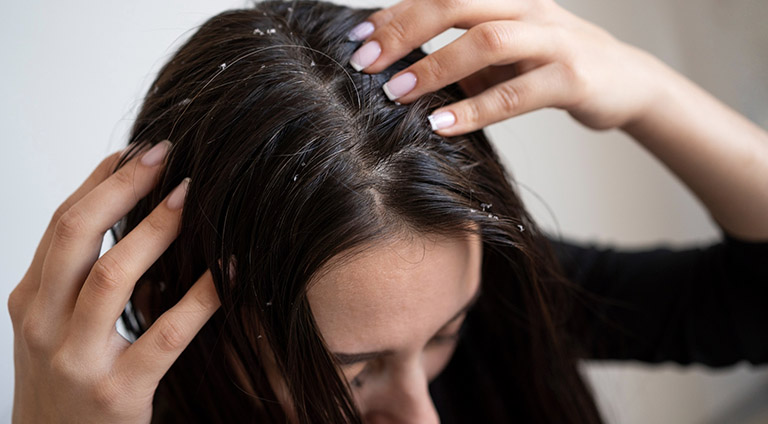Dandruff is one of the most common scalp conditions, affecting millions of people worldwide. It’s often misunderstood, leading to confusion about its causes, symptoms, and treatment. At Shree Sai Clinic in Narhe, we regularly help clients manage and treat dandruff, so we’re here to clear up some of the myths and provide you with accurate information on this prevalent issue. In this blog, we’ll dive into what dandruff is, its causes, and the symptoms to watch out for.
What is Dandruff?
Dandruff is a condition characterized by the flaking of the skin on your scalp. While it isn’t contagious or serious, it can be uncomfortable and sometimes embarrassing, especially if flakes are visible in your hair or on your clothing. The severity of dandruff can vary from mild to severe, and it can also cause itching and irritation.
Causes of Dandruff
There are several potential causes of dandruff, and understanding these can help you manage the condition more effectively.
- Dry Skin -
- Overview: Dry skin is one of the most common causes of dandruff. When your scalp is dry, it can become flaky and irritated, leading to dandruff.
- Signs: If you have dry skin elsewhere on your body, you may be more prone to dandruff caused by dryness. The flakes from dry skin tend to be smaller and less oily than those caused by other factors.
- Seborrheic Dermatitis -
- Overview: Seborrheic dermatitis is a more severe form of dandruff and is linked to an overgrowth of a yeast-like fungus called Malassezia, which lives on the scalp. This condition causes not just flaking but also redness and greasy, yellowish scales.
- Signs: It often affects oily areas of the scalp and face, such as the eyebrows, sides of the nose, and behind the ears. The flakes are usually larger and more noticeable.
- Poor Hygiene -
- Overview: Not washing your hair regularly can lead to a buildup of oils and skin cells on the scalp, which can contribute to dandruff.
- Signs: You might notice that your hair feels greasy, and flakes are more prominent, especially if it’s been a while since your last wash.
- Sensitivity to Hair Products (Contact Dermatitis) -
- Overview: Sometimes, the products you use on your hair and scalp can cause dandruff. Certain ingredients, particularly those in shampoos, conditioners, and styling products, can irritate the scalp, leading to contact dermatitis.
- Signs: If your dandruff flares up after using a new product, this might be the cause. Look for signs of redness, itching, and a burning sensation.
- Fungal Infections -
- Overview: Dandruff can sometimes be caused by a fungal infection, such as Malassezia, which thrives in oily environments on the scalp.
- Signs: Fungal-related dandruff is often accompanied by inflammation and more pronounced flaking. It may also cause itching and discomfort.
- Other Contributing Factors -
- Stress: High stress levels can exacerbate dandruff, as stress can weaken your immune system and affect your skin’s natural balance.
- Diet: A poor diet lacking in essential nutrients can contribute to dandruff. Specifically, not getting enough zinc, B vitamins, and certain fats can make dandruff worse.
- Climate: Cold, dry weather can dry out your scalp, making dandruff more noticeable. Conversely, humid weather can increase oil production, also leading to dandruff.
Symptoms of Dandruff
Recognizing the symptoms of dandruff is the first step in managing it. While the primary symptom is flaking, there are other signs to look out for:
-
White or Yellow Flakes -
The most obvious symptom of dandruff is the presence of white or yellow flakes on the scalp, hair, and sometimes shoulders. These flakes are dead skin cells that shed from your scalp. -
Itchy Scalp -
Dandruff often causes itching, which can be mild to severe. Scratching can make the condition worse and even lead to infection if the skin is broken. -
Red and Irritated Skin -
Especially in cases of seborrheic dermatitis, you might notice red patches on your scalp. The skin may also feel irritated or sensitive. -
Oily Scalp -
In some cases, dandruff is associated with an overly oily scalp. You may notice that your hair feels greasy, even shortly after washing. -
Scalp Sensitivity -
Your scalp might feel tender or sore, particularly if you’ve been scratching due to the itching.
When to See a Doctor
While dandruff can often be managed with over-the-counter shampoos and home remedies, there are times when it’s best to consult a professional. If your dandruff is severe, doesn’t improve with regular treatment, or is accompanied by significant redness, swelling, or pain, it’s time to seek medical advice. At Shree Sai Clinic in Narhe, we offer expert consultations and treatments tailored to your specific needs, ensuring that your scalp remains healthy and flake-free.
Dandruff, while common, can be a frustrating condition to deal with. Understanding its causes and symptoms is key to managing it effectively. With the right approach, you can keep your scalp healthy and your hair looking its best.




